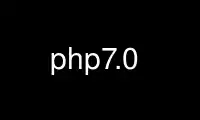
This is the command php7.0 that can be run in the OnWorks free hosting provider using one of our multiple free online workstations such as Ubuntu Online, Fedora Online, Windows online emulator or MAC OS online emulator
PROGRAM:
NAME
php - PHP Command Line Interface 'CLI'
php-cgi - PHP Common Gateway Interface 'CGI' command
SYNOPSIS
php [options] [ -f ] file [[--] args...]
php [options] -r code [[--] args...]
php [options] [-B begin_code] -R code [-E end_code] [[--] args...]
php [options] [-B begin_code] -F file [-E end_code] [[--] args...]
php [options] -- [ args...]
php [options] -a
php [options] -S addr:port [-t docroot]
DESCRIPTION
PHP is a widely-used general-purpose scripting language that is especially suited for Web
development and can be embedded into HTML. This is the command line interface that enables
you to do the following:
You can parse and execute files by using parameter -f followed by the name of the file to
be executed.
Using parameter -r you can directly execute PHP code simply as you would do inside a .php
file when using the eval() function.
It is also possible to process the standard input line by line using either the parameter
-R or -F. In this mode each separate input line causes the code specified by -R or the
file specified by -F to be executed. You can access the input line by $argn. While
processing the input lines $argi contains the number of the actual line being processed.
Further more the parameters -B and -E can be used to execute code (see -r) before and
after all input lines have been processed respectively. Notice that the input is read from
STDIN and therefore reading from STDIN explicitly changes the next input line or skips
input lines.
PHP also contains an built-in web server for application development purpose. By using the
-S option where addr:port point to a local address and port PHP will listen to HTTP
requests on that address and port and serve files from the current working directory or
the docroot passed by the -t option.
If none of -r -f -B -R -F -E or -S is present but a single parameter is given then this
parameter is taken as the filename to parse and execute (same as with -f). If no parameter
is present then the standard input is read and executed.
OPTIONS
--interactive
-a Run PHP interactively. This lets you enter snippets of PHP code that
directly get executed. When readline support is enabled you can edit the
lines and also have history support.
--bindpath address:port|port
-b address:port|port
Bind Path for external FASTCGI Server mode (CGI only).
--no-chdir
-C Do not chdir to the script's directory (CGI only).
--no-header
-q Quiet-mode. Suppress HTTP header output (CGI only).
--timing count
-T count Measure execution time of script repeated count times (CGI only).
--php-ini path|file
-c path|file Look for php.ini file in the directory path or use the specified file
--no-php-ini
-n No php.ini file will be used
--define foo[=bar]
-d foo[=bar] Define INI entry foo with value bar
-e Generate extended information for debugger/profiler
--file file
-f file Parse and execute file
--help
-h This help
--hide-args
-H Hide script name (file) and parameters (args...) from external tools. For
example you may want to use this when a php script is started as a daemon
and the command line contains sensitive data such as passwords.
--info
-i PHP information and configuration
--syntax-check
-l Syntax check only (lint)
--modules
-m Show compiled in modules
--run code
-r code Run PHP code without using script tags '<?..?>'
--process-begin code
-B begin_code Run PHP begin_code before processing input lines
--process-code code
-R code Run PHP code for every input line
--process-file file
-F file Parse and execute file for every input line
--process-end code
-E end_code Run PHP end_code after processing all input lines
--syntax-highlight
-s Output HTML syntax highlighted source
--server addr:port
-S addr:port Start built-in web server on the given local address and port
--docroot docroot
-t docroot Specify the document root to be used by the built-in web server
--version
-v Version number
--strip
-w Output source with stripped comments and whitespace
--zend-extension file
-z file Load Zend extension file
args... Arguments passed to script. Use '--' args when first argument starts with
'-' or script is read from stdin
--rfunction name
--rf name Shows information about function name
--rclass name
--rc name Shows information about class name
--rextension name
--re name Shows information about extension name
--rzendextension
name
--rz name Shows information about Zend extension name
--rextinfo name
--ri name Shows configuration for extension name
--ini Show configuration file names
Use php7.0 online using onworks.net services
